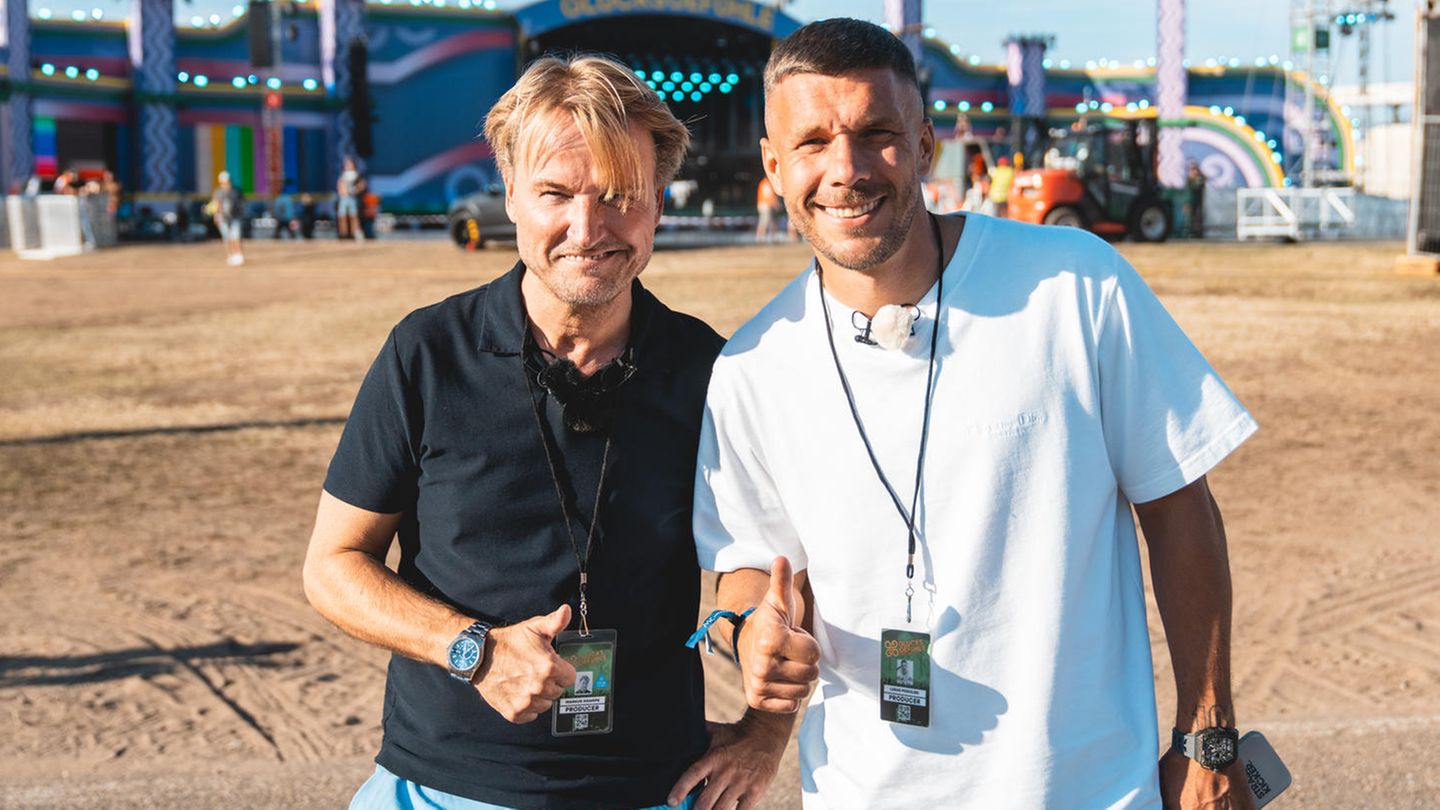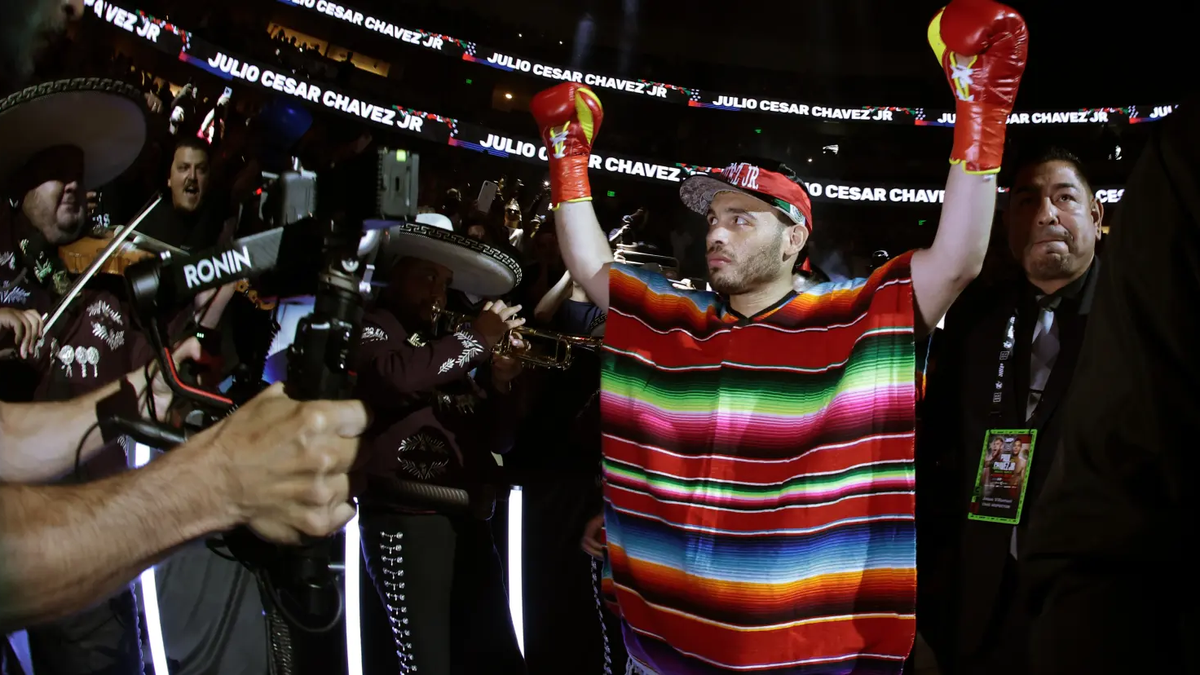Lukas Podolski is best known for his football career, but he is now also a busy entrepreneur. He even founded a music festival together with event manager Markus Krampe. A conversation about success and the right attitude to work.
As a national player, Lukas Podolski was not only known for his footballing skills, he was also known as a joker. But “Prince Poldi” has now become “Prince Business”. He makes his money in kebab shops, ice cream, soccer halls, clothes and now also with a festival. Together with event manager Markus Krampe, the ex-footballer is organizing the “Glücksgefühle Festival” for the second time in September. With the star the two talk about success, work ethic and love.
Mr Podolski, Mr Krampe, your festival means feelings of happiness – what makes you feel happy?
Podolski: Family, definitely, and of course football. Food also makes me feel happy. It’s an emotion that can be triggered by many things. Music, concerts, sport in general, this feeling is not limited. It also makes me really happy to meet people through my foundation, to make other people happy and to help.
Staple: I feel the same as Poldi, we are both family fathers. Being a father changes one or two perceptions. In the past, I felt the greatest happiness when I was out and about with the boys. Now it’s the family. But we are both very lucky that we have the privilege of being able to combine work and fun. That makes life happier. Neither of us is bitter on Monday mornings and thinks: “Wow, now we have to work all week again” – we enjoy what we do.
Food makes you happy – how did the idea of opening the kebab chain “Mangal Döner LP10” come about?
Podolski: That was when I was playing in Istanbul. The Turkish community gave me the idea, and I’ve always loved eating kebabs myself. Together with my business partner, I had the vision of reinventing the kebab. To make it more lifestyle-oriented, with a good concept, social media and marketing. Away from the simple snack bar. There are already almost forty shops.
How did you come up with the idea of creating a festival together?
Podolski: We’ve known each other for a while. Markus is a professional in event management. But what’s special is that before we decided to launch a festival, none of us had ever attended a festival. We got the idea because of Corona. When nothing was happening in the country anymore, we thought: “Come on, let’s do something really big after this.”
Staple: And somehow the number 100,000 was always floating around the room. Big means 100,000, we thought. But where do you hold a festival with so many people? Then the Hockenheimring came to mind. And the name came when a football commentator said during a Corona ghost game: “What a feeling of happiness it is when there are spectators in the stadium again?” And so the name was born. At two o’clock in the morning I sent the name idea to my employees, who had to check whether the name was still available.
What need for festivals have you seen in Germany?
Staple: During our research, we discovered that the festivals that existed up to that point all had their own special niche. Specialist festivals: Some people listen to heavy metal and go to Wacken accordingly, then there’s EDM, which is Parookaville here, or rock festivals. We wanted a mixture of EDM and pop, which hadn’t existed up to that point. Everyone around us advised us against it. There were sayings like “Just think about why that doesn’t exist. It won’t work.” We simply took our taste in music and created a festival out of it.
That means that you, Mr. Podolski, privately listen to the Backstreet Boys’ “Quit Playing Games (with My Heart)”?
Podolski: Yes, every now and then. I was also at a Backstreet Boys concert in Japan and am really looking forward to their performance at the Glücksgefühle Festival.
Many women love the Backstreet Boys – and you. You had a lot of admirers at your football wedding. How did you deal with that?
Podolski: There was always a lot going on at training, and to this day I still get letters with photos or requests for autographs. I’ve always dealt with them with humor. I usually answer them or someone from the club does. But there was no such thing as: “Hey Poldi, here’s my number and we’ll meet at the hotel.” I was never interested in that either.
You have been with your wife for 20 years. Is there a secret to eternal love?
Podolski: No, there is no secret. There is no one thing where you can say, if you do this, then you will have a happy marriage. Children are a strong bond, you have to have fun, enjoy everyday life. Also spend time together.
Staple: There is no secret formula in love, but treating each other with respect is definitely half the battle. What our wives aren’t always happy about is that Poldi and I definitely work more than we have free time.

Do you have a motto in life?
Podolski: It comes as it comes
Staple: I don’t do anything for money – even if no one from outside would believe me.
How can I understand that?
Staple: Many organizers always start by calculating that they will have so much income and so little cost, and are then surprised that things turn out differently. I simply know very few people who do things just for the money and are happy at the end. Of course, like every employee, we don’t only have rosy and fun days, but we persevere and don’t forget to have fun.
Lukas Podolski and Markus Krampe have the same work ethic
How do you define success?
Podolski: I believe that you can only be successful if you work hard at it. It might be that an idea comes to us at two in the morning and we brainstorm. You have to work, fight for it and put your heart and soul into what you do. I don’t believe in this four-day week, home office and so on. Nowadays nobody wants to work and slave away. Everyone just wants to be the next influencer and YouTube star. Luckily, I’m from a different generation, whether it’s football or business, I gave it my all. I gave up my childhood, I worked for it, I sacrificed my free time for it. I’m proud of what I’ve achieved.
Staple: I agree with Poldi on many points. We also talk about artists for the festival at two in the morning. I think that people have become too used to having too much free time during the Corona period. As an employer, I also notice that they simply no longer want to spend eight hours in an office five days a week, once they have realized that we can also lie in the park and work.
Do you think this will have consequences?
Podolski: I think people will eventually get their comeuppance. When they reach 30 or 40, they will ask themselves: “Phew, if only I had done things differently back then, pushed myself a bit harder.”
Staple: People are no longer willing to perform. In the past, an important question in a job interview was: “How much vacation do I get?” or “How much do I earn?” That’s normal, but nowadays people want to know: “What about working from home, because I have a dog or a water turtle and I have to polish its shell twice a day.” I don’t think that’s good for us in Germany. There are too many people who take advantage of working from home.
Podolski: Yes, and then you hear from politicians that people are overworked, and that the best thing would be to only work four days a week. I come from Poland, and my whole family worked eight to ten hours underground in the mines. People worked hard for the money, but here everything is luxury and paradise.
Staple: I once had a job interview with a 19-year-old who had graduated from high school the year before. I asked: “What have you been doing this year so far?” And he answered: “Well, sometimes you just have to chill out.” For a year. But the problem is not just with young people, what is set as an example at home is also crucial. If you want to achieve something in life, you have to work for it.
Mr. Podolski, what advice would you give to your 16-year-old son in this context?
Podolski: Of course, it’s a different generation today than it was back then, so I can’t tell him to think something is cool that I thought was cool when I was his age – times change. But I tell him when something in his attitude isn’t right and we teach the children discipline. I grew up on the streets in a time before smartphones, social media and without rich parents and I try to pass on these values. Sometimes he sees videos of me from back in the day and asks me: “Dad, was it really like that back then?” I don’t think I’m a bad role model.
Source: Stern
I am an author and journalist who has worked in the entertainment industry for over a decade. I currently work as a news editor at a major news website, and my focus is on covering the latest trends in entertainment. I also write occasional pieces for other outlets, and have authored two books about the entertainment industry.




